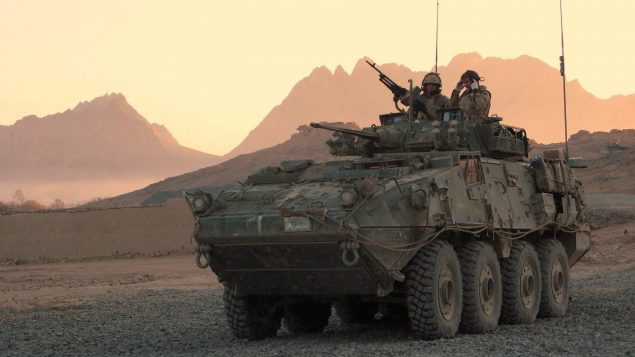It's The Liberal Way
"We, under the Conservatives, shipped about 2,000 rifles over there [to Kurdish fighters in Syria]."
"We used to brag to the Americans and the British about how great Canada was to do business in."
"We were going to make them [order for 30,000 rifles and 150,000 pistols for the Peoples Protection Units [YPG] in Canada, but it's just not worth the risk."
"I'm not SNC-Lavalin."
Jeff Hussey, former president, NorthEastern Arms
 |
| Canadian special forces soldiers speak with Peshmerga fighters at an observation post, Feb. 20, 2017. |
Military weapons manufacturing is big business everywhere; all manufacturing nations work hard to increase their sales to other ordering nations to increase their own GDP. The manufacture of weapons of war is not quite the same in terms of civil odour as, for example, manufacturing bathroom tissues; most ordinary civilians think of the trade in weapons with no little amount of distaste. When they're produced and sold to nations at war or pursuing conflict in territorial disputes, it's hard to get beyond the reality that in so doing, the selling party is an accomplice to war, destruction and death.
When, on the other hand, weapons are transferred to another country or to a military entity that is engaged in self-defence, the issue is somewhat altered; becoming one nation aiding and assisting another one against the destructive belligerence of an adversary set on conquest. Canada had a fairly long-standing support arrangement with the Kurdish military in Syria and Iraq, supplying their militias not only with the sage strategic advice of Canadian military trainers, but giving them badly-needed weapons with which to defend themselves against Islamic State, under the former Conservative government of Prime Minister Stephen Harper.
Over the past four years of government in Canada with Justin Trudeau as prime minister under the Liberal Party of Canada, there has been a pull-back; no more military trainers intervening on behalf of the Kurds, and a stop to the sale of weapons to erstwhile Kurdish allies. Long-promised military aid meant to be delivered to the Kurds, negotiated under the Harper government was set aside by the Trudeau government. No more training and equipping the Iraqi Peshmerga.
 |
| Then-Prime Minister Stephen Harper meets with Kurdish Peshmerga forces, May 2, 2015. |
Canadian military aircraft gave the Peshmerga cover in Iraq, and private companies exported arms to the Peshmerga in 2015 and 2016. Until it all gradually dried up. The Kurds continued to fight against ISIL strongholds, but Canada's bombing campaign in Syria was abruptly halted, the special forces training Kurdish fighters in Erbil halted in 2018, military resources diverted toward Baghdad's central government.
According to Mr. Hussey, the Kurdish Regional Government placed orders for 18,000 additional rifles which the new Liberal government required they first have approval from Kurdistan and Iraq for. Despite which though both Erbil and Baghdad signed off, Ottawa did not. "They basically slow-played us", he said of the Canadian government choosing not to deny the request for export permits, but failing to approve them.
Aid promised by the Canadian government in 2016 failed to arrive as promised in Kurdistan, despite that Defence Minister Harjit Singh Sajjan having ordered rifles and mortars, then leaving them in a warehouse in Montreal, failing to authorize their shipment to the Kurds. President Recep Tayyip Erdogan of Turkey considers all Kurds his enemies, calling them 'terrorists', and as a member of NATO lobbied for the West to end military aid and weapons sales to Kurds.
While taking steps to halt new military exports to the Kurds in Iraq, the Trudeua government expanded sales to Turkey of military exports. Since the Turkish invasion of northeast Syria to drive out the Syrian Defense Forces, Canada followed the lead of censuring Western countries in suspending new export permits of weapons to Turkey, even as existing permits for weapons transfers would not be affected.
And then there is the issue of Canadian arms sales to Saudi Arabia. In 2018 alone, Canada sold 1.2 billion of military weapons to Saudi Arabia, engaged in a no-holds-barred conflict in Yemen, one of the world's poorest nations, roiled by sectarian violence and attempting to cope with a proxy war between the Islamic Republic of Iran and the Kingdom of Saudi Arabia.
 |
| A Canadian LAV (light armoured vehicle (Bill Graveland/The Canadian Press) |
"This morning I sent a formal notice to the minister of foreign affairs [Chrystia Freeland] asking her to annul the export permits that have already been issued and that would allow the export of these LAVs that continue to be produced in London by General Dynamics Land Systems – Canada."
"And I have mentioned in that formal notice that if on Sept. 30 there is no positive answer, I will bring a case and ask courts to order the government to annul these export permits."
University of Montreal law professor Daniel Turp
Labels: Canada, Iraq, Islamic State, Kurds, Military Aid, Peshmerga, Saudi Arabia, Syria, Turkish Military Invasion, Weapons Sales, YPG
0 Comments:
Post a Comment
<< Home